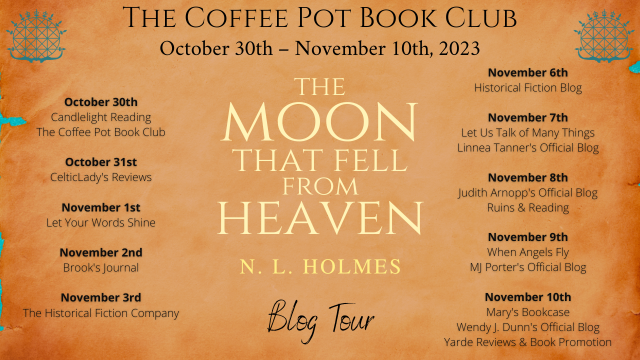
06 Nov N L Holmes The Moon That Fell from Heaven #Hittites #WomenProtagonists #PoliticalIntrigue #HistoricalFiction #BlogTour #TheCoffeePotBookClub @nlholmesbooks @cathiedunn
FEATURED AUTHOR: N.L. HOLMES
I am pleased to host N. L. Homes again as the featured author in The Coffee Pot Book Club Blog Tour being held between October 30th — November 10th, 2023. She is the author of the Historical fiction, The Moon That Fell from Heaven (Empire at Twilight Series), released by Red Adept Publishing on 26th September 2023 (307 pages)
Below are highlights of The Moon That Fell from Heaven, the author bio for N. L. Holmes, and a post about her fascinating research on the Bronze Age port city of Ugarit in northern Syria.
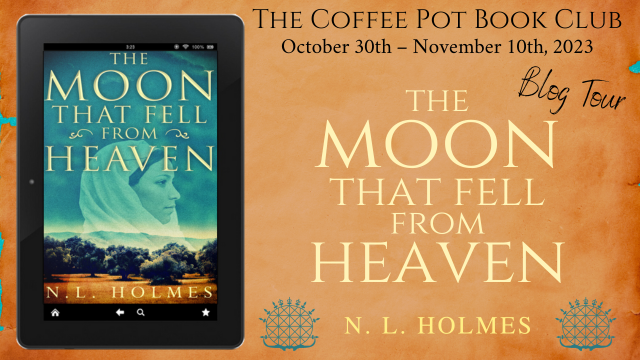
Tour Schedule Page: https://thecoffeepotbookclub.blogspot.com/2023/10/blog-tour-the-moon-that-fell-from-heaven.html
HIGHLIGHTS: THE MOON THAT FELL FROM HEAVEN
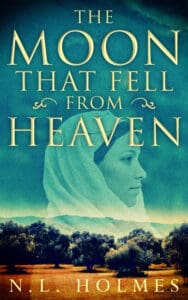
The Moon That Fell from Heaven
(Empire at Twilight Series)
by N.L. Holmes
Blurb:
Ehli-nikkalu, eldest daughter of the Hittite emperor, is married to a mere vassal of her father’s. But despite her status, her foreignness and inability to produce an heir drive a wedge between her and the court that surrounds her. When her secretary is mysteriously murdered while carrying the emperor a message that would indict the loyalty of his vassal, Ehli-nikkalu adopts the dead man’s orphaned children out of a guilty sense of responsibility.
A young cousin she has never met becomes a pretender to the throne and mobilizes roving armies of the poor and dispossessed, which causes the priority of her loyalties to become even more suspect. However, Ehli-nikkalu discovers a terrible secret that could destabilize the present regime if the pretender ever learns of it.
With the help of a kindly scribe, her brave young ward, and an embittered former soldier trapped in debt and self-doubt, Ehli-nikkalu sets out to save the kingdom and prove herself to her father. And along the way, she learns something about love.
Buy Links:
Universal Link: https://books2read.com/u/mdqeeX
Amazon UK: https://www.amazon.co.uk/Moon-That-Fell-Heaven-ebook/dp/B0CGP7B5ML/
Amazon US: https://www.amazon.com/Moon-That-Fell-Heaven-ebook/dp/B0CGP7B5ML/
Amazon CA: https://www.amazon.ca/Moon-That-Fell-Heaven-ebook/dp/B0CGP7B5ML/
Amazon AU: https://www.amazon.com.au/Moon-That-Fell-Heaven-ebook/dp/B0CGP7B5ML/
Barnes and Noble: https://www.barnesandnoble.com/w/the-moon-that-fell-from-heaven-n-l-holmes/1143996343?ean=9781958231340
Kobo: https://www.kobo.com/ww/en/ebook/the-moon-that-fell-from-heaven
AUTHOR BIO: N. L. HOLMES

N.L. Holmes is the pen name of a professional archaeologist who received her doctorate from Bryn Mawr College. She has excavated in Greece and in Israel and taught ancient history and humanities at the university level for many years. She has always had a passion for books, and in childhood, she and her cousin used to write stories for fun.
These days she lives in France with her husband, two cats, geese, and chickens, where she gardens, weaves, dances, and plays the violin
Author Links:
Website: https://www.nlholmes.com/
Facebook: https://www.facebook.com/nlholmesbooks
LinkedIn: https://www.linkedin.com/in/n-l-holmes/
Twitter: https://www.twitter/nlholmesbooks
Instagram: https://www.instagram.com/n l.holmes/
Tumblr: https://www.tumblr.com/blog/nlholmes
Pinterest: https://www.pinterest.com/nlholmesbooks/
Book Bub: https://www.bookbub.com/authors/n-l-holmes
Amazon Author Page: https://www.amazon.com/N-L-Holmes/e/B0858H3K7S
Goodreads: https://www.goodreads.com/author/show/20117057.N_L_Holmes
POST: RESEARCH ON UGARIT
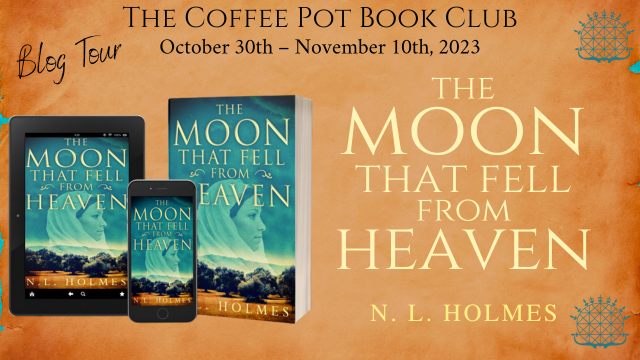
My research on Ugarit, the mighty midget of the Late Bronze Age, began eleven or twelve years ago when I taught a course at the University of South Florida called Ancient Near Eastern Empires. Its main focus, of course, was the big players like Egypt and the Hittite Empire, but there’s no way to understand the dynamics among such polities without looking at border zones like Ugarit. This seaport and caravan terminus in northern Syria (near modern Latakia) wielded disproportionate influence because of its wealth. Sometimes a vassal of Egypt and sometimes of Hatti, they almost singlehandedly provided the navy of their Hittite masters, a landlocked power.
Having always been interested, both personally and professionally, in this part of the world—especially the Phoenicians—I had studied Hebrew and Arabic and found the Ugarites, with their closely related Semitic language, a fascinating bunch. My class looked briefly at the culture and art of the place, but then we got into the snippets of diplomatic correspondence that had survived the fiery downfall of the city in the early twelfth century BCE. That’s when my eyes really lit up.
Modern historians are indebted to the violent end of Ugarit, because the conflagration that spelled a permanent finish to its habitation also baked the clay tablets that made up its archives. Piecemeal and random though they are, they have given us incomparable glimpses into the diplomatic doings of Ugarit and its neighbors near the end of its days. One of the most interesting events, described partially in a number of different fragments, was King Ammishtamru’s divorce from his Amurrite queen, a Hittite princess through her mother. What on earth had she done, that such a prestigious princess would be cast off? It turns out there were inklings of sedition… and adultery. At first, she was sent home to neighboring Amurru. But then the king extradited her and had her put to death. Their small son had to relinquish any claim to the succession.
This episode provided the main plot of my first novel, The Queen’s Dog. When I set The Moon That Fell from Heaven in the same city seventeen years later, it was fun to speculate about where life had moved the survivors. What had become of the dispossessed little prince, for example? A lot of scholarly attention has turned in recent years to the causes of the so-called Sea People event that brought down Ugarit and many other kingdoms of the Bronze Age. It’s almost always agreed that the states that didn’t survive the collision had internal flawlines already opening: social unrest, dynastic infighting, flailing economies—here they all were in embryo. The Umman-manda were just one group of roaming dispossessed who wandered from the Aegean to the border of Egypt. By disrupting inland caravans upon which Ugarit depended in its luxury trade, half of the city’s economy was dumped overboard. Add to that a pretender with a good claim to the throne, and you have radical instability. The happily preserved archives of Ugarit dropped a myriad of hints, bare one-liners, that could add up to a fuller picture of a society close to the edge.
Other kinds of details came to me through more purely archaeological finds. For example, I studied the plan of the palace until I knew it like a native. Of course, that was only the ground floor—the upper stories had fallen in. But evidence of an earthquake was there. The garden and its kiosk were there. The court of the royal dead with its dynastic tombs was there, and the porch, and the bridge between the palace and the city wall. All these details gave me the geography of the action. And readers of The Queen’s Dog will remember the creepy sewer tunnel under the palace plaza, which really existed and lent itself so wonderfully to a clandestine crossing.
So when people ask “How do you start out a novel?”, it’s an easy answer. With research. Because there, buried in the pile of factoids about the past, are the outlines of everything an author needs: the events, the characters, and the setting.
 Instagram Handle: @thecoffeepotbookclub
Instagram Handle: @thecoffeepotbookclub

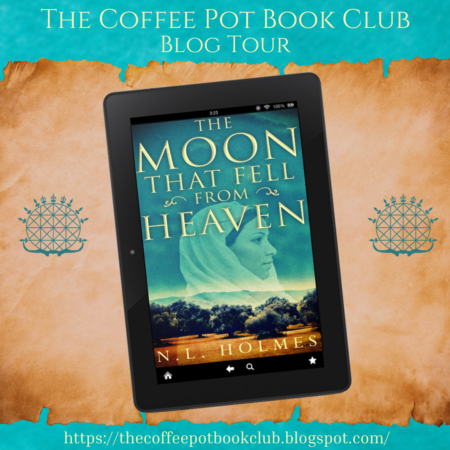

Cathie Dunn
Posted at 03:30h, 07 NovemberThanks so much for hosting N.L. Holmes today, with such a fascinating guest post.
Take care,
Cathie xo
The Coffee Pot Book Club
Linnea Tanner
Posted at 11:55h, 07 NovemberHi Cathie–It is a pleasure to host N.L. Holmes again. I have read some of her books and find the civilizations in the Bronze Age period fascinating.